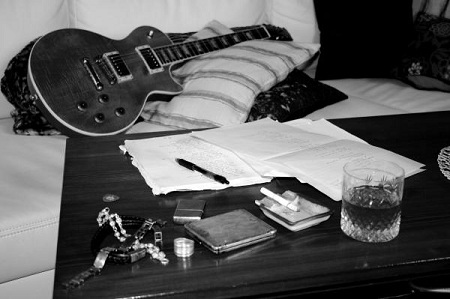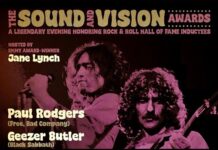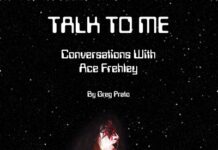By Chris Epting
We all have those songs that have gotten into our blood. They make our hearts beat faster when we hear them, and they grab us and drag us back into the places where we first fell in love with them (and people and things). They may be more powerful they we even know, summoning up the warm black light glow of all those sacred tastes, touches and aromas of our youth; the buckets of moments that washed over us, baptizing us in the experiences of crazy, indulgent adolescence.
Musically, I’m still partially grounded in the 1970s, when I came of age on AM radio, FM radio, 45s, LPs, cassettes and 8-tracks — when every sort of genre lived happily together along the dial in perfect harmony. Power pop, bubblegum, rock and roll, glitter, glam, R&B, pop, soul, funk, then punk, disco; they all rubbed up against each other and it was all good. The radio dial was like a musical buffet.
Then I started noticing something as that era faded into the rear view mirror of my black Plymouth Duster. While many songs were like emotional release triggers to my heart, mind and soul, woven within these songs were single lines that jumped out and had a power all their own; lyrical anchors to latch onto as they wafted by on the airwaves.
For example, who doesn’t get a rise of out Bowie’s “Suffragette City,” right? But what about that extra lift provided by the song’s climactic exultation, “Wham, bam, thank you, ma’am!” before the last chorus fade? That single line, in concert, became the rallying point for the crowd. Each time I saw Bowie in the 70s, he knew the crowd had his back on that sentence; that they’d sing without him having to direct it. That line seemed to live outside of the song. It became an emblem for the swinging 70s, a defining term for the basic sexual hit-and-run. So what if it may have been first uttered in the 1948 play Mister Roberts, where a sailor character says, “Well there goes the liberty. That was sure a wham-bam-thank-you ma’am!” As far as we knew, this was a Bowie-ism, pure, simple and glittery. And it came to represent not just the song, but an attitude.
Lines like that jump out at me in lots of songs. Some are more obvious than others, and maybe it’s just to my ears, but it’s a very real thing; how a single line conveys something extra suggestive, or mysterious or evocative, thus giving it (and the entire song) extra staying power.

As epic and exotic as the whole of “Stairway to Heaven” was, is and will and always be, how stunning and interesting is the enigmatic line, “If there’s a bustle in your hedgerow, don’t be alarmed now”? I remember being 12 years old, trying to resolve that single sentence. What did it mean? Was it some strange Viking code? Some Aleister Crowley occult-inspired inner circle Zeppelin lingo?
As the Urban Dictionary breaks it down:
“A hedgerow is a hedge that surrounds many estates in Britain.
Bustle, or noise or activity, used in this sense, means a disturbance close to home. Something’s happening in your world!”
It’s just a spring clean for the May Queen.
“Spring cleaning is an old domestic ritual cleaning meant to do away with the troubles of the past year and prepare for the coming year, and often includes disposing of old, useless things that have been lying around.
The May Queen was a maiden chosen by a village to represent the hopes and potential for the coming year. She was a symbol of beauty, spring and new beginnings.
So here, as an analogy, the lyric refers to getting rid of old and outdated systems in order to allow progress to occur.
Or it can refer to menarche, or the first menstrual cycle, signifying that a girl is coming of age.”
Are they right? Who knows? And who really cares? The meaning isn’t the point. The point is the mystique of the line; the power of the unknown (and yes, that is a song with many contenders for lines like this).
And these break out lyrical moments are not all cloaked in brooding, arcane language. Whenever I hear, “Friday night they’ll be dressed to kill, down at Dino’s bar and grill,” I get a different, but no less powerful a sensation. Thin Lizzy’s “The Boys are Back in Town” is an amazing song to me, full of gutsy, ballsy and spirited blue-collar imagery.
But when Phil Lynott gets to the first line of the last verse, he has done something extra special. He has set up a final desperate scene, where jukeboxes blare favorite songs and summer is waiting around just around the corner for even more hell break loose. When he sings that line, I see Dino’s in my mind, I see them all dressed to kill, and then, and only then, am I ready for drinks to flow and yeah, maybe even for some blood to spill. But it all starts with that first beautiful line.
There are many more defining lyrical moments from the 1970s, just as there are from any era. But the 70s speaks to me differently. It’s my first taste of everything. It’s part of my past, present and I know it will be my part of my future. All thanks to the songs, and those individual lines that rise up from within those songs like signposts along the highway, representing and reminding you forever just how special that piece of music is.
Just like the era that spawned it.

Chris Epting is the author and photographer of 20 travel/history books, including James Dean Died Here – The Locations of America’s Pop Culture Landmarks, Led Zeppelin Crashed Here – The Locations of America’s Rock and Roll Landmarks and All I Really Need to Know I Learned From KISS, life lessons from the hottest band in the land.
He is also an award winning travel writer, journalist and frequent contributor to AOL Music. Originally from New York, Chris now lives in Huntington Beach, California with his wife and their two children. He is working on his next book, not surprisingly called, If There’s a Bustle in your Hedgerow – 50 lyrical lines from that helped define the 1970s.




















